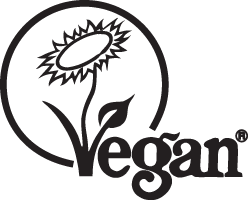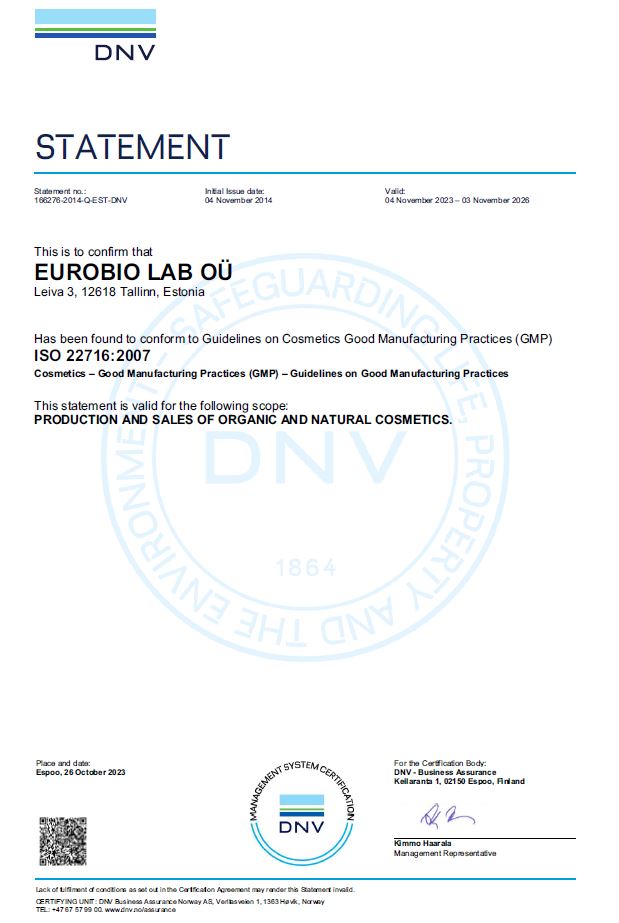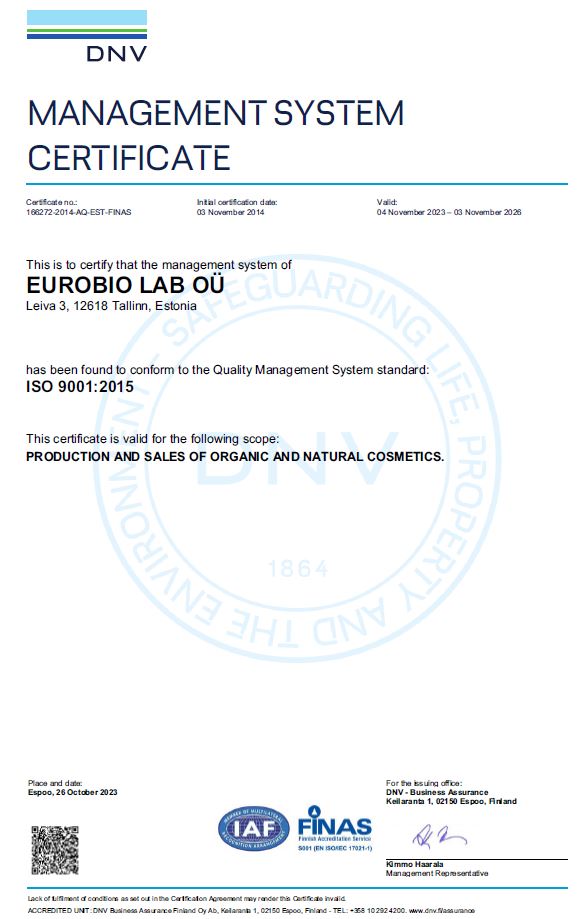Certificates
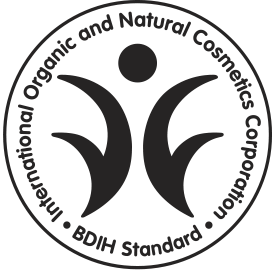
BDIH is one of the oldest and most stringent European certification systems created in Germany
BDIH Bundesverband Der Industrie-und Handelsunternehmen (German: Association of Manufacturers and Distributors) is a German based organisation comprising over 440 producers and distributors of cosmetics, food supplements, health productsand health products that has developed a comprehensive set of guidelines for certifying natural cosmetics and which has now tested over 9.500 products.
The following guidelines define the concept of natural cosmetics in a sensible and clear manner, with the consumer’s expectations of safe and ecologically sound products in mind:
1) raw materials obtained from plants should be used from:
- controlled biological cultivation, taking quality and availability into account, or
- controlled biological wild collections
2) Deliberate rejection of
- organic-synthetic dyes
- synthetic fragrances
- ethoxylated raw materials
- silicones
- paraffin and other petroleum products
3) It is forbidden to sterilize natural and organic raw materials and finished cosmetic products using radioactive radiation.
For the production of natural cosmetics, it is permissible to use components which are processed through hydrolysis, hydrogenation, oxidation, reduction, esterification, transesterification or other methods of cleavage and condensations from the following natural materials:
- fats, oils and waxes
- lecithins
- lanolin
- monosaccharides, oligosaccharides and polysaccharides
- proteins and lipoproteins
The actual raw material use is regulated by the positive list for development and production of certified natural cosmetics.
4) To ensure that products are microbiologically safe, certain nature-identical preservatives are allowed in addition to natural preservatives. These are:
- benzoic acid and its salts
- salicylic acid and its salts
- sorbic acid and its salts
- benzyl alcohol
- dehydroacetic acid and its salts
When these preservatives are used, products must be labelled “preserved with … [name of preservative]” etc.
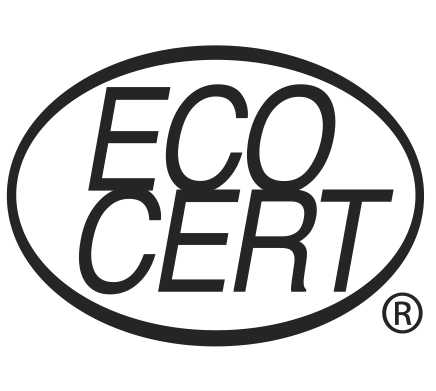 Ecocert was the very first certification body to develop standards for "natural and organic cosmetics"
Ecocert was the very first certification body to develop standards for "natural and organic cosmetics"
What are the benefits of cosmetics with the ECOCERT
ECOCERT: an inspection and certification body for sustainable development. Founded in 1991 in France, it conducts inspections in over 80 countries, making it one of the largest organic certification organizations in the world.
Guaranteeing purity and quality, the ECOCERT certificate is both the most stringent and prestigious standard among the manufacturers of natural and organic cosmetics.
It establishes requirements for formulations of manufactured products containing natural ingredients and for the quality of vegetable raw materials. The use of animal ingredients and the practice of animal testing are prohibited.
Organic ingredients used in cosmetics must comply with ECOCERT requirements:
• Seeds of plants are not subjected to genetic modification.
• Chemical fertilizers are not used on farms.
• Pesticides are not used. Pest control is carried out with the help of natural enemies or non-toxic alternatives approved by ECOCERT.
Products are manufactured and stored in eco-friendly premises.
Special documentation procedures allow you to track the production of cosmetics, from quality raw materials and packaging to its final delivery to the consumer.
Twice a year, ECOCERT conducts an inspection of production lines to confirm that all of its requirements are being carried out. ECOCERT not only regulates the components of its cosmetic products, but the entire production process.
Products certified by Ecocert are eco-friendly as well as the enterprise which produce it.
Natural and organic cosmetic certified by ecocert Greenlife according to ECOCERT standard available at http://cosmetics.ecocert.com
 COSMOS (Cosmetic Organic Standard) is a Europe-wide private standard
COSMOS (Cosmetic Organic Standard) is a Europe-wide private standard
Addressing the excesses and failures of current developments is a key challenge for our society.
Establishing a “sustainable development” that would reconcile economic progress, social responsibility and maintain the natural balance of the planet is a project in which the cosmetics sector is willing to be fully involved. The application of the principles of sustainable development in economic activity implies however changing patterns of production and changing consumption practices. Recognizing these challenges, the responsibility of its actors, the organic and natural cosmetics sector clearly shows its ambition to go further in sustainable development with the setting at the European and international level of a new standard for organic and natural cosmetics.
The COSMOS-standard is a new cosmetic certification developed to harmonize various certifications and labels in order to create one standard that is internationally recognized for natural and organic cosmetics.
The new certification is a result of Europe’s leading natural cosmetic certifiers coming together and forming a non-profit association, COSMOS-standard AISBL.
The COSMOS-standard association consists of five founding members who now authorize and oversee the certification, including the Soil Association (UK), Ecocert (France), Cosmebio (France), BDIH (Germany) and ICEA (Italy). All current licensees and members of the founding partners are able to apply for product certification. The new Standard applies to cosmetic products marketed as organic or natural. The certification process will inspect a range of criteria in the following categories:
- Origin and processing of ingredients
- Composition of total product
- Storage, manufacturing and packaging
- Environmental management
- Labeling and communication
- Inspection, certification and control.
The standard goes beyond analyzing ingredients used to formulate the final product. It takes a comprehensive approach to natural and organic certification involving a review of the product’s total environmental and human impact.
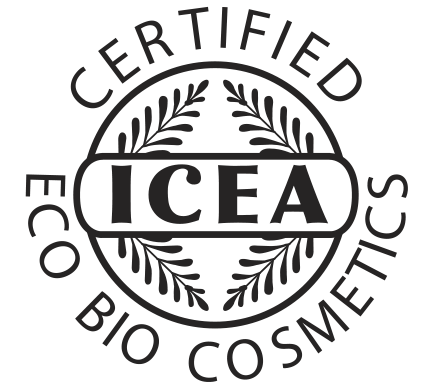
ICEA, Environmental and Ethical Certification Institute, Italy
ICEA
Institute of Ethic Certification (ICEA) is the main certifying body of natural cosmetics (organic cosmetics, biocosmetics, ecocosmetics ) in Italy.
Italian Association of Organic Agriculture (AIAB) and the Institute of Ethic Certification (ICEA), together with a group of manufacturers, have developed leading principles for natural and organic cosmetics.
Cosmetics, meeting all the rigid requirements of certifying body, receives the status of «organic», and the package has a corresponding marking:
What does ICEA control?
All stages of cosmetics manufacturing annually undergo a rigid system of certification. A whole range of other requirements to organic products is being inspected:
- absence of artificial additives, technologies of genetic engineering during manufacturing;
- everything concerning exhaust, waste, energy sources, transport and sanitary-hygienic standards is rigidly regulated;
- production and storage are being carried out in accordance with rigid ecological rules;
- ICEA inspections (audit) are carried out several times a year, with a trip to the production location;
- a special order of documentation is being implemented; it allows to monitor all the chain from raw materials producer to end consumer; all documentation registering raw material receipt, its processing and shipment of ready products undergoes an obligatory inspection.
How are plants cultivated and processed for organic cosmetics?
Vegetable stock used in organic cosmetic products, has to:
- to be cultivated in controlled bio- farms;
- to be harvested under bio-control in locations of its natural growth;
Cultivation of ECO BIO cosmetics has to be carried out without:
- genetically modified seeds
- chemical fertilizers
- pesticides, fungicides, herbicides
- cultivation need to be carried out by eco-friendly harvesting machinery
Treatment and processing of raw materials has to be carried out without:
- chemical, synthetic preservatives
- synthesized dyes
- synthesized stabilizers
- harmful technologies: atomic product tests, chemical preservation, gassing of products in vacuum packaging, product processing with phenol, radiation exposure
- when testing raw materials animal testing is prohibited
- it is prohibited to use animal-originated raw materials which have been produced harming animals, e.g. animal collagen, animal elastin etc.
- synthesized fragrances
- using storage packaging containing PVC and other halogen-containing polymers
The Vegan Society Trademark United Kingdom
The Vegan Society coined the word 'vegan' in 1944. The trademark is registered in Europe, USA, Canada, Australia and India and used worldwide on over 22,000 products.
The Vegan Society is among the most trusted certifiers of vegan products with its logo that says “Vegan” along with a blooming flower in a circle. You can be sure that if a product has the logo, it follows the animal free standards of the Vegan Society. By proudly carrying the internationally recognized Sunflower logo of The Vegan Society, we are showing that we have a products range is suitable for vegans.
ISO 22716 is the standard describing the Cosmetics Good Manufacturing Practices. Cosmetics Good Manufacturing Practices (GMP) is one of the pillars of the New European Regulation for Cosmetics.
This regulation sets very high requirements to ensure consumers’ safety. Amongst these new legal requirements, all cosmetics products circulating onto the European Market will have to be produced according to the Cosmetics Good Manufacturing Practices described by the ISO 22716 standard. It has been written in collaboration with cosmetics industry professionals and promotes best-in-class methods.
The scope of ISO 22716 is not only limited to production activities but also includes control, storage and expedition
All participants in the cosmetics products chain, European and non-European, are concerned. Ingredients producers, products final assembler, distributors and importers/exporters, all actors are involved and new responsibilities have been defined
Cosmetics Good Manufacturing Practices are a set of hands-on advice, operational rules and organizational guidelines especially focused on human, technical and administrative factors affecting product quality.
The objective of the GMP is to define the activities which lead to the final product corresponding to the expected specifications, and therefore product safety.
ISO 9001 is the most recognized international quality management standard. It promotes enhanced customer satisfaction through continual improvement of the effectiveness of management system.
Certification of quality management system demonstrates commitment to consistency, continual improvement and customer satisfaction.
ISO 9001 provides specific requirements for a quality management system that enhances ability to consistently deliver products that meet customer - as well as statutory and regulatory - requirements.
Independent assessment and certification of quality management system by DNV GL gives a clear demonstration to the market that company works to apply an effective quality management system in your organization.

.png)
